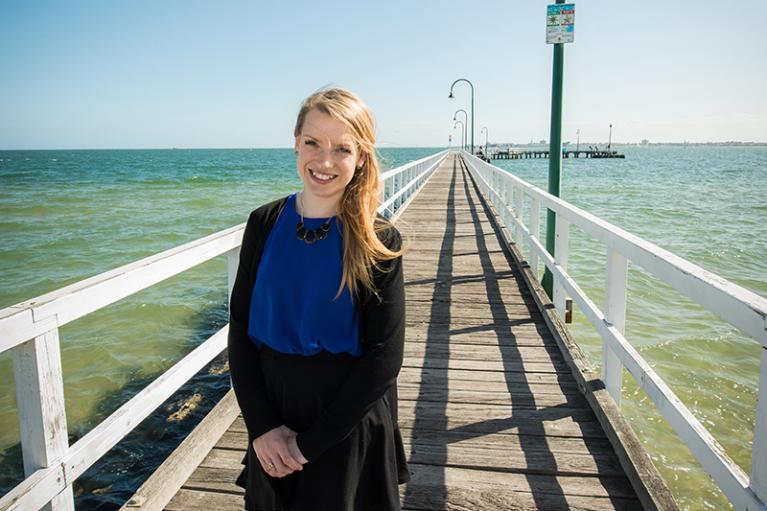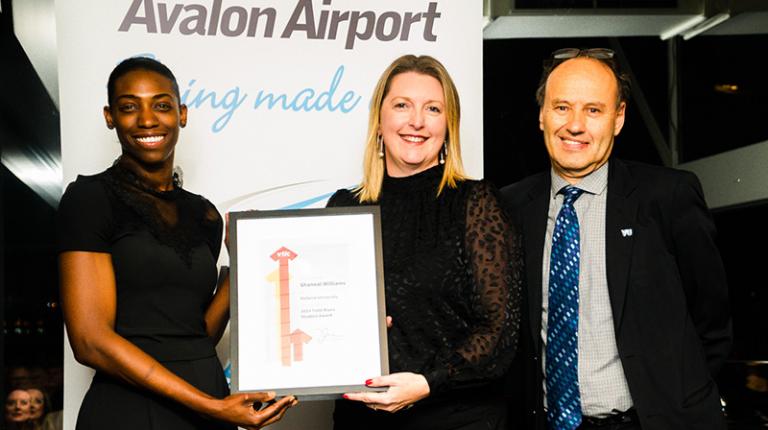Overview
Become a leader in the exciting world of tourism and events, with a Master of Tourism, Hospitality and Events Management from Victoria University.
Our respected postgraduate qualification prepares you for managerial, policy development, and planning roles within the tourism, hospitality and events industries.
Our masters degree will equip you to tackle challenges faced by destinations at home and internationally. In particular, you'll gain expertise in ‘Green Growth’ and sustainability and how these themes benefit businesses in the sector and local communities.
The course is developed and conducted with the close involvement of industry leaders – both local and international. You will have the opportunity to see industry operations in action, build your professional networks, and apply your learning within the tourism, hospitality and events sectors.
On graduation, you will have expertise in the following career-focused areas:
- managerial, policy development and planning
- economic, legal and political contexts within which destinations operate
- creative planning and policy development processes
- innovative sustainable practices
- risk-minimising strategies in contemporary settings.
Genuine industry experience
You will hear from industry speakers and visit tourism sites during your study, building your career networks and knowledge. You will also take part in activities that replicate professional situations.
In your applied business project, you will generate knowledge to help entire organisations solve contemporary business problems.
These experiences prepare you for the world of work, so you can hit the ground running as you take the next step in your career.
Benefit from our industry networks
With a long history in tourism education, we offer well-developed industry networks. Adjunct professors from the tourism sector inform our course design, contribute to its delivery and participate in events.
Exposure to industry practitioners provides you with many opportunities to develop your industry networks, and apply authentic learning to industry problems.
Be part of our School for the Visitor Economy
The School for the Visitor Economy is a cross-university school providing the hospitality, tourism and event management industries with qualified professionals.
The school builds on VU’s long history of producing highly qualified tourism and destination management graduates, locally and internationally. It also undertakes and facilitates cross-disciplinary research, underpinning growth and sustainability in tourism destinations and visitor-economy–related businesses.
Fast-track your degree
If you have an Australian bachelor degree in human resources, business (or similar discipline), you may be eligible for an exemption of 48 credit points of study.
If you receive 48 credit points for previous study, you may be able to qualify with a masters in 1.5 years, enabling you to launch your professional management career sooner.
Study in convenient 8-week blocks
Following the overwhelming success of the revolutionary VU Block Model with undergraduate students, we have rolled out the Block Model to our postgraduate courses.
We deliver this course in an eight-week mode, which means you study two units (subjects) at a time over eight weeks (or one unit at a time over eight weeks for part-time study), rather than juggling several units at once. And with its focused timetables and smaller, collaborative classes, VU’s Block Model gives you more time to connect with your peers, lecturers and industry partners, helping you build strong professional networks.
The VU Block Model has improved our student results and engagement, and has won multiple international awards for innovation and excellence.

Benefit from our specialised School for the Visitor Economy.
Careers in tourism, hospitality and event management
On graduation, you will be well prepared to apply for work in the sector.
Pick your area of passion, and aim for one of the following roles:
- tourism planning and promotion agency staff member
- policy officer with professional and industry associations
- manager of attractions
- conference coordinator
- hotel or resort service manager
- marketing and communication role (events)
- planner within the travel sector (airlines and other major transport providers)
- self employment through tourism management businesses
- planning and policy development officer in government departments at national, state and local and regional levels
- research and planning officer with research and consulting firms.
Course structure
To attain the Master of Tourism Hospitality and Events, students will be required to complete 192 credit points consisting of:
- 48 credit points business core units
- 96 credit points professional core units
- 12 credit points BMO5501 Business Ethics and Sustainability; and,
- 12 credit points BMO7006 Applied Business Project (Capstone); and,
- 24 credit points elective units. Please check any pre-requisite requirements prior to enrolling.
Course structure and units
College Core Units
-
- Unit code
- BAO6504
- Credits
- 12
-
- Unit code
- BEO6000
- Credits
- 12
-
- Unit code
- BEO6600
- Credits
- 12
-
- Unit code
- BMO6506
- Credits
- 12
Professional Core Units
-
- Unit code
- BMO6050
- Credits
- 12
-
- Unit code
- BTD6001
- Credits
- 12
-
- Unit code
- BTD7001
- Credits
- 12
-
- Unit code
- BTD7002
- Credits
- 12
-
- Unit code
- BTD7004
- Credits
- 12
-
- Unit code
- BTD7005
- Credits
- 12
-
- Unit code
- BTD7006
- Credits
- 12
-
- Unit code
- BTD7007
- Credits
- 12
Core Units
-
- Unit code
- BMO5501
- Credits
- 12
-
- Unit code
- BMO7006
- Credits
- 12
24 credit points elective units
Learning outcomes
On successful completion of this course, students will be able to:
| 1. | Critically reflect upon theoretical approaches by evaluating their application to effective tourism, hospitality and events in the context of destination management practice; | ||
| 2. | Justify and interpret interdisciplinary knowledge in decision making with creativity for dynamic global environments using contemporary and integrated theoretical and operational knowledge of tourism, hospitality and event management; | ||
| 3. | Deliberate the economic, legal and political context within which destinations operate, advocating creative planning and policy development process, innovative sustainable practices and risk minimising strategies in contemporary settings; | ||
| 4. | Propose creative solutions for industry, government and community stakeholders, integrating complex knowledge and ideas effectively to achieve shared goals; | ||
| 5. | Resolve complex professional and industry problems and inform management decision making by applying cognitive, creative and reflective skills to collect, analyse and synthesise data and information to generate, implement and evaluate solutions; | ||
| 6. | Justify and interpret theoretical propositions, methodologies, conclusions and professional decisions to specialist and non-specialist audiences including multi-disciplinary teams, diverse cultural communities, businesses and other related stakeholders; | ||
| 7. | Exemplify professional standards and leadership in a dynamic 21st century work environment, acting consistently, ethically and in a socially responsible manner; and, | ||
| 8. | Formulate and execute an evidence-based capstone experience or an industry-based research project linked to contemporary sustainable practices. |
What's a unit?
A unit or 'subject' is the actual class you'll attend in the process of completing a course.
Most courses have a mixture of compulsory 'core' units that you need to take and optional elective units that you can choose to take based on your area of interest, expertise or experience.
Credits
Each unit is worth a set amount of study credits based on the amount of time you study. Generally, 1 credit is equal to 1 hour of study per week.
Fees & scholarships
Fee type definitions
The amount you pay for your course depends on whether you’re offered a Commonwealth supported place (CSP) or a full fee-paying place.
Students who enrol in a:
- Commonwealth supported place pay tuition fees that are partly subsidised by the Australian government
- full fee-paying place need to pay the full amount for all enrolled units before census each study period.
In addition to your tuition fees, you may also be charged a Student Services & Amenities Fee (SSAF).
Scholarships & assistance
Apply for a scholarship to help with your study costs.
We can help with fee assistance and advice.
Admission & pathways
Meeting the minimum admission requirements does not guarantee you entry into this course. Some courses receive more applications than the number of places available. In this situation we will also assess your education, work and other relevant experience.
If you do not meet the minimum requirements you may be eligible for one of our special admission programs. We also encourage you to explore our study pathways to help you reach your goal.
Find out more about how to apply for our courses, and our commitment to admissions transparency.
Entry requirements
Completion of an Australian Bachelor degree (or equivalent) in any discipline
OR
Completion of an Australian Graduate Diploma (or equivalent) in a similar discipline
OR
Applicants without an undergraduate qualification may be admitted to the Graduate Diploma based on approved work experience. Upon completion of the Graduate Diploma, graduates will be eligible for admission to this course with credit granted for completed units.
Pathways from VU courses
There are many ways you can start your education journey at VU. Pathways offer an easy transition between courses at different levels, so that you can start with a certificate and progress right through to postgraduate study.
Find out more about pathways and credits.
Credit for skills and past study
Advanced standing: Applicants with an Australian Bachelor degree (or equivalent), or higher, in a similar discipline may be eligible for an exemption of 48 credit points of study.
Use our credit calculator to find out how much credit you could get towards your course, based on your previous study.
If you have completed study with another university or institution and believe you are eligible to receive credit for skills and past study, you can apply for advanced standing.
Applications for advanced standing can be made after a discussion with your course chair or academic adviser.
How to apply
Applications for this course are not being taken at this time.
Browse our other Tourism, hospitality & events courses or send us an enquiry to be notified of updates relating to this course.
Enquire now
Please fill out the form below, and we'll get back to you shortly.
Get help
- Visit a student service centre
- 1300 VIC UNI (1300 842 864)
- Visit the glossary
At Victoria University, we aim to display accurate and complete course information online. However, we are unable to guarantee that every course change is currently displayed. You may contact the University directly on +61 3 9919 6100 to confirm the most up-to-date course fees, pathways and credit transfer, recognition of prior learning, admission and enrolment procedures, examinations and services available to our students.

.jpg?itok=GY874tm8×tamp=1490152451)

